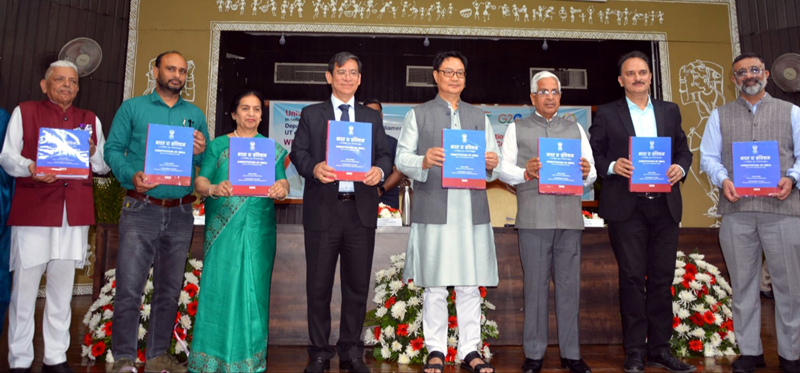Srinagar: Union Minister for Law and Justice Kiren Rijiju on Saturday unveiled his plan for the creation of four regional benches of the Supreme Court of India which would subsequently lead to several fundamental changes in the country’s administration of justice. Rijiju’s plan for creating the SC’s North, South, East and West benches could make justice more accessible for the people of India and eventually lead to some structural changes in the organisation of the high courts.
Speaking at a gathering after releasing the first Dogri edition of the Constitution of India at the University of Jammu, he said, “A similar practice can be later implemented in the High Court and even lower courts so that these courts too are beyond the four walls of their complexes…The people will be able to file a case in the Supreme Court while sitting in Jammu,” Rijiju said.
He disclosed that an exercise to affect changes in the system was in progress. Chief Justice of Jammu and Kashmir & Ladakh High Court, Justice Kotiswar Singh was present on the occasion.
Expressing concern over pendency of cases in all courts of law, Rijiju said that the Mediation Bill was in its final stage. “We wanted the bill to be introduced in the Budget session of Parliament (which concluded on Thursday) but we couldn’t do so. Now, the bill will be introduced in the Monsoon session of Parliament,” he said, adding the legislation could reduce pendency of cases, especially civil suits by 40 to 45 percent.
Without directly mentioning August 2019 or abrogation of the Article 370 of the Constitution of India, Rijiju asserted that the situation in Jammu and Kashmir was “as good as it seems in other parts of India”. “It was the Prime Minister’s thought provoking decision,” he said and lauded those who implemented it on ground including security forces, Government officials and public representatives. He equally praised the working of the judiciary in the politically sensitive Union Territory.
“The pendency is touching 5 crores now which is a concern. The virtual courts and regional benches could come up. I have committed to J&K that all the courts here must have all modern facilities”, Rijiju said and later committed Rs 7,000-crore budget for e-Courts through a tweet. It will make courts paperless,” Rijiju said later in a tweet. He said that in a high population State like the UP, people had to wait for a date of the hearing for years and decades.
“It’s a momentous occasion, a memorable day has happened today. I think of how the common man can get justice. PM Modi has said that the colonial setup has to be cleaned up. This is one amongst Panch Pran by Narendra Modi,” he added. He said that English as lingua franca was a reality to survive but education and literature in mother tongues like Dogri—now included in the Eighth Schedule—was also imperative.
“It has been late as in the Constitution there has been a provision for choosing the state language. As Law Minister, I feel that it has been late. Our department has digitized 65,000 words of legal glossary for common people which are used regularly. We are cloud-sourcing. We have told the courts to work in our own language. In the Supreme Court may be in future that can also be done. We are trying to achieve that,” he added.
The Minister elaborated that the Rs 9000 crore outlay for upgradation of infrastructure in the lower judiciary and Rs 7000 crore for the e-Courts project is aimed at making the process of delivery of justice easily accessible and freely available. He said that the time was not far away when the courts would become totally paperless after completion of the 3rd phase of the e-Court project. He said that the project had greatly aided in the working of courts during the COVID-19 pandemic.
The Union Minister greatly admired the young lawyers who contributed to furthering the agenda of the National Legal Services Authority in providing free justice to people. He pointed out that the concept of pro bono is a wonderful cause and the elite lawyers should also contribute in extending their services through this programme for the larger good of the public. He asserted that the judiciary has the vital function of striking a balance between ensuring freedom of speech and safeguarding the unity, integrity and sovereignty of the nation simultaneously.




















